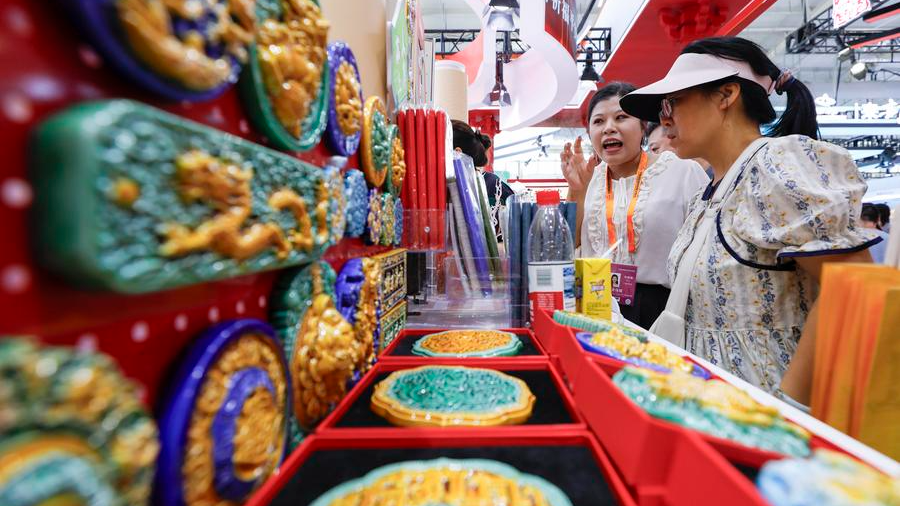People select cultural and creative products at the Cultural & Tourism Services exhibition area during the 2025 China International Fair for Trade in Services (CIFTIS) at Shougang Park in Beijing, capital of China, Sept. 14, 2025. (Xinhua/Chang Nengjia)
BEIJING, Oct. 9 (Xinhua) -- China will further advance the development of international consumption center cities, establish a number of international consumption clusters and inbound consumer-friendly business districts, improve the consumption environment to meet international standards, optimize payment services, and expand the scope of unilateral visa-free countries in an orderly manner.
It is learned that multiple government departments, including the Ministry of Commerce and the Ministry of Finance, will roll out new measures to bolster support for inbound consumption. The initiatives aim to enhance the appeal of "China Travel" and "China Shopping", and the development of international consumption center cities is identified as a central pillar of this strategy.
Industry experts indicate that these measures will accelerate efforts to unlock China's inbound consumption potential, generating new opportunities for such sectors as retail-cultural creativity, cultural-tourism integration, and cross-border payment services.
-- Inbound consumption gathers steam as policies take effect
According to data released by Beijing Customs, from January to August this year, the Beijing's dual hub airports, namely Beijing Capital International Airport and Beijing Daxing International Airport, verified 26,819 tax-refund applications for departing travelers, representing a year-on-year increase of 223.98 percent. The total value of goods covered by these applications reached 832 million yuan, up 92.77 percent compared with the same period last year.
Such scenarios are becoming increasingly common, particularly in major cities like Shanghai, Beijing, Guangzhou, Tianjin, and Chongqing. Fu Yifu, a special researcher at Jiangsu Su Merchants Bank, noted that these five cities were designated by the State Council in 2021 to cultivate themselves into international consumption center cities, and have since evolved into core hubs for enhancing the appeal of "China Travel" and "China Shopping". For instance, Shanghai now ranks among the top cities worldwide in terms of global retailer concentration, while commercial hubs like Beijing's Wangfujing have achieved a deep integration of global brands and premium domestic products.
Since the beginning of this year, multiple relevant ministries and commissions have intensified efforts to develop international consumption center cities, continuously enhancing their global influence, consumption-driving capacity, and central radiating effect. Concurrently, the implementation of refined policies, such as the optimized departure tax-refund policy, has accelerated the unlocking of inbound consumption potential.
Statistics show that as of the end of August, the number of departure tax-refund stores in the country had exceeded 10,000, tripling the figure recorded at the end of 2024. From January to August, the number of individuals utilizing the tax-refund service surged by 248 percent year on year, with corresponding sales subject to refunds growing by 98 percent year on year.
-- More policy sweeteners in pipeline as multiple departments step up support
At present, China's inbound consumption still trails international benchmarks by a relatively significant margin. According to an analysis by Fu, with inbound spending accounting for merely 0.5 percent of GDP -- well below the global average of 1 percent to 3 percent, the sector demonstrates substantial growth potential.
According to the Ministry of Commerce, multiple government departments including the Ministry of Commerce and the Ministry of Finance, will strengthen overall coordination and policy support to further promote the expansion of inbound consumption.
Sheng Qiuping, Vice Minister of Commerce, stated at a recent press conference that efforts will be strengthened to enhance coordination, promote the orderly expansion of unilateral visa-free countries, and optimize visa-free policies for inbound travelers. In the near future, the ministry will also collaborate with the Ministry of Finance to advance the building of an internationalized consumption environment, such as by improving payment services and elevating service standards to international levels.
As policy measures are strengthened, a calendar of related activities is now being rolled out. The China International Premium Consumption Month will be held during this year's Canton Fair and China International Import Expo. This large-scale consumption promotion event is jointly organized by the Ministry of Commerce and the five international consumption center cities.
Zou Yunhan, a researcher with the State Information Center, stated that international consumption center cities serve as vital indicators of China's economic strength and level of opening up. By aggregating global consumption resources, these cities can lead consumption trends and function as pivotal hubs for expanding consumption, stimulating domestic demand, and connecting domestic and international markets.
-- Vast potential seen as inbound consumption expands and upgrades
Experts believe that inbound consumption is poised for further expansion and upgrading, driven by the leading role of international consumption center cities.
Fu anticipates that as more policy incentives take effect, inbound consumption will evolve from single-purpose shopping to integrated business-tourism-culture-sports experiences, with its structure extending beyond premium luxury goods to include trendy "guochao" or "China-chic" products and specialized services.
Zou also pointed out that inbound consumption will show the following development trends in the future. First, inbound tourism is demonstrating new characteristics such as diversified source markets, a shift toward independent travel, rising popularity of niche destinations, and more immersive, lifestyle-oriented experiences. Second, cultural trends like "guochao" are having an increasingly greater impact. China's profound cultural heritage adds charm to inbound consumption, and commodities and services incorporating Chinese cultural elements will become new growth points. Third, consumption scenarios will become more diversified. Inbound consumption will gradually expand from mainly featuring special commodities to the service sector. New business forms and models of experiential consumption will bring more spiritual enjoyment to inbound tourists.
Regarding specific industries, Fu believes that these policies will bring benefits to many fields. For example, in the retail and cultural creative sectors, domestic products such as 3C electronics and intangible cultural heritage-inspired cultural and creative products are gaining access to international markets with the support of tax-refund policies. (Edited by Yang Yifan with Xinhua Silk Road, yangyifan@xinhua.org)




 A single purchase
A single purchase









